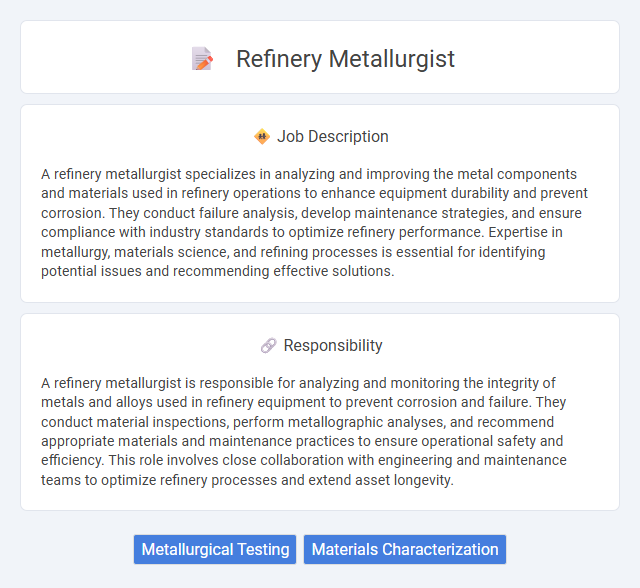
A refinery metallurgist specializes in analyzing and improving the metal components and materials used in refinery operations to enhance equipment durability and prevent corrosion. They conduct failure analysis, develop maintenance strategies, and ensure compliance with industry standards to optimize refinery performance. Expertise in metallurgy, materials science, and refining processes is essential for identifying potential issues and recommending effective solutions.
Refinery metallurgist roles likely suit individuals with strong analytical skills and a keen attention to detail due to the precision required in monitoring metal properties during production. People who thrive under pressure and enjoy problem-solving in high-stakes environments probably find this job fitting, given its critical impact on refinery safety and efficiency. Those with a preference for routine or low-stress roles may find the dynamic and technically demanding nature of this position less compatible.
Qualification
A refinery metallurgist typically requires a bachelor's degree in metallurgical engineering, materials science, or a related field, with extensive knowledge of metal properties and refining processes. Professional certifications such as Certified Metallurgist (CM) or membership in organizations like the American Society for Metals (ASM) enhance job prospects. Hands-on experience with failure analysis, corrosion control, and process optimization is essential for ensuring the structural integrity and efficiency of refinery equipment.
Responsibility
A refinery metallurgist is responsible for analyzing and monitoring the integrity of metals and alloys used in refinery equipment to prevent corrosion and failure. They conduct material inspections, perform metallographic analyses, and recommend appropriate materials and maintenance practices to ensure operational safety and efficiency. This role involves close collaboration with engineering and maintenance teams to optimize refinery processes and extend asset longevity.
Benefit
Refinery metallurgists likely experience benefits such as competitive salaries and opportunities for career advancement in the energy sector. They may also gain access to cutting-edge technology and contribute to improving the efficiency and safety of refining processes. Job stability and potential for specialized training could further enhance the appeal of this role.
Challenge
Refinery metallurgist roles likely involve complex challenges related to monitoring and analyzing metal properties to prevent equipment failures and optimize refinery operations. The probability of encountering unpredictable material degradation and corrosion issues could require innovative problem-solving and advanced technical expertise. Managing these challenges effectively may significantly impact refinery safety, efficiency, and cost control.
Career Advancement
Refinery metallurgists specialize in analyzing and improving metal materials used in refining processes, ensuring equipment integrity and preventing failures. Career advancement often involves progressing to senior metallurgist roles, leading corrosion control initiatives, or transitioning into management positions within refinery operations. Gaining certifications such as NACE CIP and developing expertise in failure analysis and materials engineering significantly enhance promotion prospects in this field.
Key Terms
Metallurgical Testing
A refinery metallurgist specializes in metallurgical testing to evaluate the chemical and physical properties of metals used in refining processes. They conduct tests such as tensile strength, hardness, corrosion resistance, and microstructure analysis to ensure material integrity under extreme conditions. Accurate metallurgical testing helps prevent equipment failure, optimize maintenance schedules, and improve refinery safety and efficiency.
Materials Characterization
Refinery metallurgists specialize in analyzing and characterizing materials used in refining processes to ensure equipment durability and operational efficiency. They employ advanced techniques such as scanning electron microscopy (SEM), X-ray diffraction (XRD), and spectroscopy to identify material composition, microstructures, and potential corrosion or fatigue issues. Their expertise supports failure analysis, preventative maintenance, and optimization of metallurgical properties critical to refinery safety and performance.
 kuljobs.com
kuljobs.com